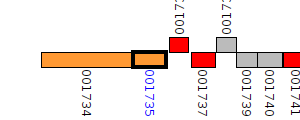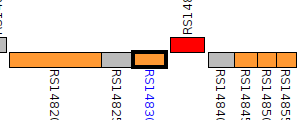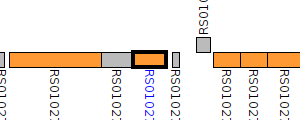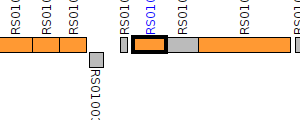In order to generate a more inclusive dataset of Pseudomonas genes mapped to putative in-paralogs and putative orthologs in other Pseudomonas species/strains, we developed a Pseudomonas Orthologous Groups classification system.
To generate ortholog groups, pair-wise DIAMOND searches were run on all genomes in the database to find reciprocal best hits (RBHs) for each gene. These analyses often resulted in multiple candidate genes for RBH status, which were narrowed down by examining the similarity between the query's flanking genes and the hit's flanking genes. If two candidate genes were directly adjacent, they where both accepted as RBHs that involve putative in-parology.
Pairwise intra-genome DIAMOND searches were also performed to acquire in-paralog information (i.e. gene duplications occurring after species divergence). If two genes in one genome were reciprocally more similar to each other than to any gene in the other genomes, the two genes were designated putative in-paralogs. Ortholog groups are built by starting with a seed gene and then adding all genes to which there is a RBH or in-paralog relationship.
Every new gene added to an ortholog group was then treated as a seed gene and the addition process was repeated until all qualifying genes had been added. The result was the development of orthologous groups, specifically generated for Pseudomonas species genomes, which can be used to sort search results.
Pseudomonas Ortholog Group POG000154
| Strain | Locus Tag | Description | Same-Strain Members | Fragment ? | |
|---|---|---|---|---|---|
| Pseudomonas sp. GM25 | PMI24_02741 |
RND transporter
|
2 same-strain members: PMI24_01702 PMI24_02741 |

|
|
| Pseudomonas sp. GM30 | PMI25_001735 |
RND transporter
|
2 same-strain members: PMI25_001735 PMI25_001649 |

|
|
| Pseudomonas sp. GM30 | PMI25_001649 |
RND transporter
|
2 same-strain members: PMI25_001735 PMI25_001649 |

|
|
| Pseudomonas sp. GM41(2012) | PMI27_003840 |
RND transporter
|
2 same-strain members: PMI27_003840 PMI27_005881 |

|
|
| Pseudomonas sp. GM41(2012) | PMI27_005881 |
RND transporter
|
2 same-strain members: PMI27_003840 PMI27_005881 |

|
|
| Pseudomonas sp. H1h | U862_RS0114290 |
RND transporter
|
2 same-strain members: U862_RS0114290 U862_RS0121130 |

|
|
| Pseudomonas sp. H1h | U862_RS0121130 |
RND transporter
|
2 same-strain members: U862_RS0114290 U862_RS0121130 |

|
|
| Pseudomonas sp. HMP271 | DP64_RS09275 |
RND transporter
|
1 member |

|
|
| Pseudomonas sp. HPB0071 | HMPREF1487_06465 |
efflux transporter, RND family, MFP subunit
|
1 member |

|
|
| Pseudomonas sp. KG01 | ACR52_RS02125 |
RND transporter
|
2 same-strain members: ACR52_RS02125 ACR52_RS14830 |

|
|
| Pseudomonas sp. KG01 | ACR52_RS14830 |
RND transporter
|
2 same-strain members: ACR52_RS02125 ACR52_RS14830 |

|
|
| Pseudomonas sp. LAIL14HWK12:I12 | D902_RS0102765 |
RND transporter
|
2 same-strain members: D902_RS0102765 D902_RS0121565 |

|
|
| Pseudomonas sp. LAIL14HWK12:I12 | D902_RS0121565 |
RND transporter
|
2 same-strain members: D902_RS0102765 D902_RS0121565 |

|
|
| Pseudomonas sp. LAIL14HWK12:I5 | F629_RS0100380 |
RND transporter
|
2 same-strain members: F629_RS0100380 F629_RS0107350 |

|
|
| Pseudomonas sp. LAIL14HWK12:I5 | F629_RS0107350 |
RND transporter
|
2 same-strain members: F629_RS0100380 F629_RS0107350 |

|
|
| Pseudomonas sp. LAIL14HWK12:I6 | D907_RS0102755 |
RND transporter
|
2 same-strain members: D907_RS0102755 D907_RS0114455 |

|
|
| Pseudomonas sp. LAIL14HWK12:I6 | D907_RS0114455 |
RND transporter
|
2 same-strain members: D907_RS0102755 D907_RS0114455 |

|
|
| Pseudomonas sp. LAIL14HWK12:I7 | D886_RS0101775 |
RND transporter
|
2 same-strain members: D886_RS0101775 D886_RS0120975 |

|
|
| Pseudomonas sp. LAIL14HWK12:I7 | D886_RS0120975 |
RND transporter
|
2 same-strain members: D886_RS0101775 D886_RS0120975 |

|
|
| Pseudomonas sp. LAIL14HWK12:I9 | D903_RS0116525 |
RND transporter
|
2 same-strain members: D903_RS0101635 D903_RS0116525 |

|